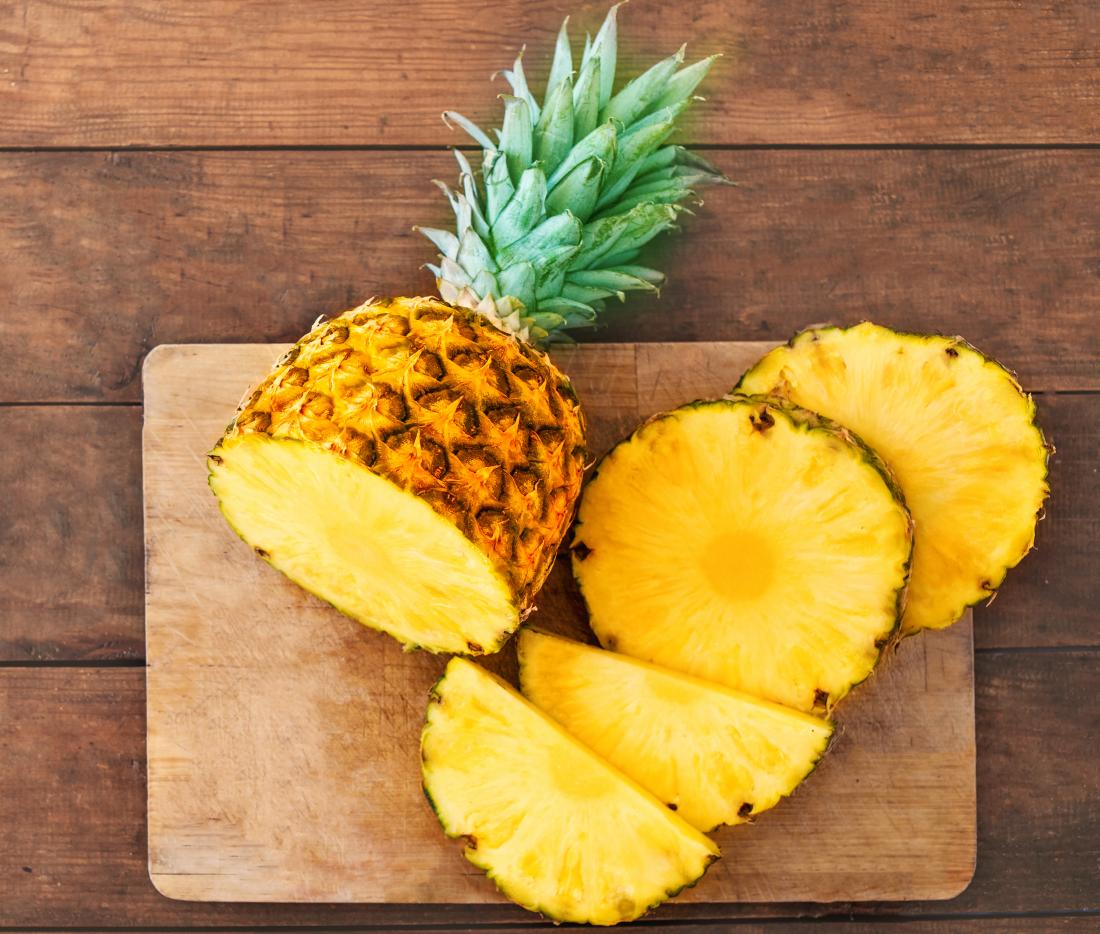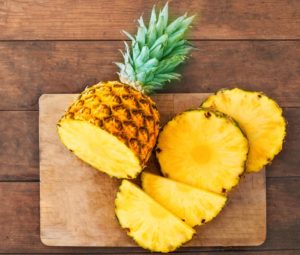
 Pineapple is a healthy tropical fruit, known for its tangy and delicious taste. Scientifically known as Ananas comosus, pineapple or Ananas was originated in South America, where early European explorers gave it the name due to its resemblance to a pinecone. It was considered an exotic fruit earlier, but now it is pretty common across the globe. The fruit can be enjoyed in solid, dried, and juice forms. Apart from its delicious taste, pineapple is also known for its medicinal properties. The fruit has been used for centuries to treat digestion and inflammation issues.
Pineapple is a healthy tropical fruit, known for its tangy and delicious taste. Scientifically known as Ananas comosus, pineapple or Ananas was originated in South America, where early European explorers gave it the name due to its resemblance to a pinecone. It was considered an exotic fruit earlier, but now it is pretty common across the globe. The fruit can be enjoyed in solid, dried, and juice forms. Apart from its delicious taste, pineapple is also known for its medicinal properties. The fruit has been used for centuries to treat digestion and inflammation issues.
Nutrient content of pineapple
Pineapple is a member of the bromeliad family. According to the Purdue University Center for New Crops and Plant Products, it is in fact, the only bromeliad that produces edible fruit. Pineapple is made of many individual flowers whose fruitlets have joined around the core. Each pineapple scale is an individual flower or berry.
In terms of nutrients, pineapple contains a high amount of vitamin C and manganese, providing 131 per cent and 76 per cent of the daily recommendations, respectively. The low-calorie fruit is also rich in dietary fiber and bromelain (an enzyme that can play an important role in keeping you healthy).
One cup (165 grams) of pineapple chunks contains:
Calories: 82.5
Fat: 1.7 grams
Protein: 1 gram
Carbs: 21.6 grams
Fiber: 2.3 grams
Vitamin C: 131% of the RDI
Manganese: 76% of the RDI
Vitamin B6: 9% of the RDI
Copper: 9% of the RDI
Folate: 7% of the RDI
Potassium: 5% of the RDI
Magnesium: 5% of the RDI
Iron: 3% of the RDI
Besides, the pine fruit also contains trace amounts of vitamins A and K, phosphorus, zinc and calcium.
Here are some reasons why you must eat pineapple.
It may help to ease digestive issues
Pineapple is also known to provide relief from digestive issues. The enzyme bromelain, present in a high amount in pineapple, helps to break down protein molecules into their building blocks. This helps them to be absorbed across the small intestine more easily, providing relief from any kind of indigestion issues. Eating pineapple is particularly beneficial for those suffering from pancreatic insufficiency, a condition in which the pancreas cannot make enough digestive enzymes. Apart from this, due to its high fiber and water content, the fruit can also prevent constipation and keep the gut lining healthy.
It may reduce the risk of cancer
Several studies carried out in the past indicates that compounds present in pineapple can also help to fight cancer, which is commonly linked with oxidative stress and chronic inflammation. Lab test shows that bromelain may suppress the growth of breast cancer cells and stimulate cell death. It can be effective in suppressing cancer in the skin, bile duct, gastric system and colon, among other areas. Other studies suggest that beta-carotene present in the pine fruit can also have a protective effect on prostate cancer.
It may boost immunity
Pineapple contains a wide variety of vitamins and minerals, which can help to boost immunity and suppress any kind of inflammation. Having pineapple can also lower the risk of both viral and bacterial infections. Studies suggest that children who had pineapple recovered from sinus infection significantly faster as compared to standard treatment. It is believed that these anti-inflammatory properties of the fruit can aid the immune system.
It may ease the symptoms of Arthritis
Arthritis is a common joint issue of old age that involves inflammation in the joints. Bromelain, which is the main enzyme in pineapple, has anti-inflammatory properties that may provide pain relief to those with inflammatory arthritis. Studies carried in the 1960s shows that bromelain was used to relieve symptoms of rheumatoid arthritis. The enzyme has the capacity of providing relief from arthritis symptoms, especially in the short term. A lot more research is needed to understand the effect of having bromelain in the longer term.
It may help from speedy recovery after exercise
Including pineapple in the diet can also reduce the time taken to recover from surgery or exercise. This benefit largely contributed to the anti-inflammatory properties of bromelain. Studies indicate the enzyme present in pineapple can reduce inflammation, swelling, bruising and pain post-surgery or an intense exercise session. Another study suggests that having bromelain after 45 minutes of strenuous exercise on the treadmill can reduce inflammation and help to maintain more strength afterwards.
It may be good for your bones
Pineapple is a rich source of several nutrients including calcium and manganese. These nutrients can help to prevent osteoporosis, which is a common joint problem of old age and can also improve overall bone density. You need to be extra careful while consuming manganese as taking too much of it may increase the risk of cognitive disorders. 1 cup of fresh pineapple is more than enough in a day.
It may be good for your skin
The vitamin C and beta carotene-rich fruit can be extremely beneficial for the skin when consumed or applied topically. It can help to fight skin damage caused by the sun and pollution, reduce wrinkles, and improve overall skin texture. Vitamin C can also help in the formation of collagen.
Risk factors
Due to its bromelain content, pineapple is used as a meat tenderizer. The enzyme rapidly breaks down the protein and muscle structure of the meat and turns it mushy over time. Eating too much pineapple at one time can also lead to tenderness of the mouth, including the lips, tongue and cheeks. It can feel a little uncomfortable for a while but it would resolve itself within a few hours. Persistent rash, hives or breathing difficulties can be a matter of concern. In such a situation, immediately seek medical attention.
The enzyme bromelain can also interact with some medications and may turn dangerous. Those taking antibiotics, anticoagulants, blood thinners, anticonvulsants, barbiturates, benzodiazepines, insomnia drugs and tricyclic antidepressants should be careful while consuming pineapple.
Having unripe pineapple or drinking pineapple juice can be toxic for your health. It can lead to severe diarrhoea and vomiting. The high vitamin C content in pineapple can also be problematic. Consuming the C vitamin in large quantities may induce diarrhea, nausea, vomiting, abdominal pain or heartburn. So, try to eat pineapple in moderation.







